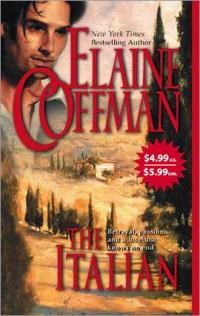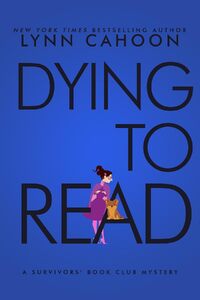 BITTER GREENS |
 The books of May are here—fresh, fierce, and full of feels. |

Purchase
The Italian Chronicles #2 Romance Historical Excerpt of The Italian by Elaine CoffmanBeatrice was standing beside the piano, but not too close to the candelabra that gave the gown the gleam of an old coin. She took a sip of wine, and listened to the compliments Uncle Tito paid Aunt Gisella, who looked beautiful in emerald green satin. Upstairs, Angelo made the last adjustment to his white cravat in the hall mirror before he went downstairs. As he drew near the salon, he heard voices, and hearing the same voice from this afternoon, decided the English lady from Florence must have stayed for dinner. He walked into the room, wearing only black, with a white shirt and fitted trousers. He kissed his mother, and reached for the glass of wine his father offered, when suddenly the sound of breaking glass interrupted the moment. Angelo’s head jerked around, and he saw danger standing by the piano. His first thought was, if this was his mother’s married friend from Florence, it was going to be a problem for she was dangerously seductive, and his blood was running red tonight. "I am so sorry," she said. "Don’t worry, my dear," his mother said, hurrying to the woman’s side. "I am thankful you did not spill it on your beautiful dress." Angelo saw the narrow shoulders, the lovely bosom with the plunging neckline that was definitely French, and golden hair. He liked what he saw so far. His father led her away from the piano and handed her another glass of wine. She smiled at him and said, "Are you certain you trust me with this?" "Unequivocally," Tito said. Angelo watched the exchange. She was lovely, whomever she was. Composed, dignified, with an incredible sense of bearing. Familiarity hovered in the air like a static charge, but never settled upon him. The room fell into an awkwardly silence. Gisella brought her hand to her head. "Madonna mia! Don’t tell me you don’t recognize her." The woman looked down at her feet. Angelo knew many English women, but he knew only one shy one. "Hello Mouse." She watched him with eyes as bright and innocent as daisies. Her nod was almost undetectable. She said "Hello," and the word floated over him like silk. "I am relieved you finally recognized her, although I hardly think it appropriate to call her mouse. She is scarcely the same woman she was five years ago." "Oh, I can see that for myself." Angelo said as he studied Beatrice’s slight form. "Some things need no explanation." It was a rude shock to his system, seeing her thus, and like her, he was still trying to recover. A graceful woman was a deceptive being, capable of hiding much, for illusion was her element. He saw in Beatrice all of these things, for the woman he remembered was a mere illusion compared to the woman standing before him. Gisella looked from one to the other. "I must say it certainly took you long enough to realize it." "I fear I would be easy to forget, Aunt, considering I did my very best to be invisible whenever Angelo was around." "Exquisitely shy, I recall." "I am still shy, but now I am also confident." "Interesting." He was aware of his mother standing silently beside him-- something quite rare for her—with an enlightened look on her face. A look he would call amusingly interested danced in her eyes. "You are curiously quiet," he said to her. "I have suddenly realized one can learn a lot by remaining silent," Gisella said "You should not have let father hear you say that." "Too late now. I cannot believe that after all these years, I am finally witnessing my wife learning the great truth of silence," Tito said. A gust of wind came through the open windows. Somewhere in the house a door slammed. Angelo’s body gave a jerk and he turned sharply in the direction of the sound. His pose was defensive as he gave the room close scrutiny. "It was only the wind catching a door," Gisella said, looking at him with a suspicious eye, and a face that had gone suddenly pale. He was aware of the way Beatrice looked at him as well. He saw the questions in both of their eyes. He knew they wanted to ask, Why are you so tense? He did not want to answer them right now. How could he? How could he tell them the truth of what it was like to always watch your back and to sleep with your pistol under your pillow, eyes half open? Only his father pretended not to notice. "I am quite famished," he said. "What do you saw we go in to dinner. I will escort your mother," he said to Angelo." Angelo went to Beatrice and offered her his arm. "May I?" "A pleasure," she said, and walked with him into the dining room. Angelo was trying to decide if he would prefer to sit across from her to view her lovely face, or next to her so he could see just how low the décolletage of that gown really was. His mother removed the decision when she said, "Beatrice, you may sit there, and Angelo, please take the chair across from her." The wine was poured, and Tito lifted his glass with a toast. "To family," he said, "and to the celebration of the return of two family members long absent." "To family," everyone repeated and raised their glass. The meal was served along with the conversation. Angelo noticed how Beatrice was queried frequently, how she handled the press of questions, as well as being he object of so much attention. He was a man of quick judgments and keen insight. In Bea he saw something genuine in a woman who was open, but not overly eager to please. She presented the facts as they were, without a hint as to how she wished them to be accepted. This was something he rarely saw in a world of subterfuge, pretense, and treachery, where lying was considered an art. "Bea, you must tell Angelo about your life, your artistic endeavors, since your last visit here," Gisella said. "I’m afraid it would seem quite calm and boring after the excitement and danger he lives with," she replied. "Calm and boring is precisely what I hoped to find when I returned," he said. "Mother said you were an artist now. I never knew your interests lay in that direction." Her face reddened, but only slightly. "I always knew I wanted to be an artist, but prior to coming to Italy, it was never something I considered seriously. I began, as many artists do, with lessons, to discover if I had no talent, or to establish the fact that I did." "That must have been a terrifying first step," Tito said. Bea smiled. "Terrifying is a perfect description, Uncle. At that time in my life, it would have been easy to intimidate me into believing I could not draw a straight line. The English can be quite daunting, you know. As a child I always loved to hear the story of Queen Elizabeth. My favorite was her answer to her council who opposed her on Mary Queen of Scots." Angelo watched as she paused to take a sip of wine, and as she tilted the glass, her head came up and her gaze met his. He let his gaze drop lower, along her throat and down to the place where her dress plunged. Yes, he thought, she has changed, and wondered if Paris was responsible. When he looked back at her, she was no longer looking at him, but the flush of color to her face said she knew he was there. "Well, don’t keep us waiting," Gisella said. "What did Queen Elizabeth say?" "Oppose me, and I will make you shorter by a head." Everyone laughed and Angelo added a sense of humor to the list of attributes he was compiling about this woman he had once loved—sobering reminder though it was. He wondered if he was getting old, for he had trouble reconciling the woman he remembered with the woman he saw and listened to now. He stroked his chin, fighting the allure of a highly desirable woman he desired once before. The attraction was still there, which surprised him, since he thought things between them were concluded long ago. He was suddenly curious as to why he felt attracted to her a second time, when it had never been his way to rekindle a past romance. His curiosity aroused now, he asked himself why? Is it a bona fide attraction, one born of a desire to get even, a remnant of long lost feelings, mere curiosity to see where her feelings lay, or the need to know why she left in the first place? He dropped his hand and gave his attention to what she was saying. "A succession of painting tutors came and went for almost two years, until I began to feel I could teach them something. It was not pompous bragging, but something based upon fact. I knew my execution was more careful, and I had a truer feel for color and tone than most of those who taught me." "I don’t think that is bragging either," Tito said. "It is being confident, as I am confident last year’s Chianti is far better than the year before." "Is that when you began to paint on your own?" Gisella asked. "No, it was when I knew I was ready to be taught by the masters, but you must understand that a woman has to be approaching the rank of genius, in order to convince one of the masters to take a woman to tutor, and even then, a woman can never expect the same advantages afforded to men." "But there have been many excellent women artists, and quite famous ones," Uncle Tito said. "Our own Artemisia, for one," Angelo said. "True, but unfortunately I did not have a father who was a painter as Artemisia Gentileschi, Angelica Kauffmann, or Mary Moser, who were all women fortunate enough to have a family member as a mentor." "So that meant there were no opportunities for you to have an introduction by any means other than your own talent and hard work," Gisella said. "Yes, and not only for me, but for women artists in general." Angelo was becoming more interested in this, and heard himself ask, "Did you find they did not accept you, or that they did not take you seriously?" "Both. More than once, I was advised to "dabble in the arts," as a way to amuse myself. One teacher’s advice was, "Paint if you must, but as a pastime. Never, ever my dear, take it seriously." "I keep thinking how this conversation would have exploded by now, if Serena were here," Tito said. "There is nothing that raises her ire like the repression of women. Hearing your stories makes me want to apologize to you for having not one whit of artistic ability." "If it makes you feel better, I do actually consider myself fortunate not to have had an artist figure in my immediate family. Many women who did, often found their works signed by them as well." "Now that would send Serena through the roof," Gisella said, "and it makes me furious as well. I cannot believe anyone would tolerate such." Beatrice replied, "It is tolerated because men are considered serious artists, while women are thought to be too fragile to pursue artistic endeavors." When this conversation began, Angelo had already decided to listen but not to become involved in her life. But to listen to her speak about her past, the injustices against her, the obstacles she faced and overcame, were as outrageous as she portrayed them. There was a time in the past when he would have thought differently, but after dealing with the Austrian’s and the repression of the people, he was against injustice in any form against men or women. But to involve himself with Beatrice again, or her life would be a big mistake. While Angelo rejected any involvement with her or her past, he realized that he resented the injustices against her. There should not be one set of rules for men and another for women, any more than there should be one set for the rich and another for the poor. He felt the beginning throb of a headache. He lifted his glass and finished his wine, having decided if he was going to get a headache, he would prefer the cause to be wine rather than women. Dessert was served. Angelo had wine instead. He was about to have another glass, when his father requested a bottle of champagne. When the champagne was poured, Tito stood and turned toward Angelo. He lifted his glass in a manner remindful of a salute and said, "To my son, who has always pleased me immensely. I have never missed a day when I did not give thanks to God for the blessing and privilege of raising you and the joy of seeing the man you have become. And so, it is to you, Angelo, that I raise my glass with a father’s pride." Angelo drank to the toast, and embraced his father, totally overwhelmed. Before he could speak, Tito withdrew a folded document from his pocket and handed it to Angelo. "I can think of no finer tribute to give you than to say, I have this day, signed the papers to transfer the land of my ancestors to you. With love, honor and gratitude your mother and I give Villa Adriana to you. Although we do retain visitor’s rights," he added with a wink. Angelo was stunned. Although he knew he would probably inherit Villa Adriana, he never dreamed it would come to him so soon, and certainly not when he was so involved with the liberal movement. "I don’t know what to say. It is something I have always dreamed of, but I never thought it would happen while I was still relatively young." Tito laughed an said, "Twenty-eight is young . . . not relatively so." "Let us move into the salon," Gisella said. As he did before, Angelo walked with Beatrice. "I’m glad all of your difficulties becoming an artist had a happy ending." "Oh, I am still working on that. I have the training. Now I must become the artist." "What are your plans?" "I have not made up my mind completely. I have just concluded three years of study in Paris, where I received several offers for commissions to paint portraits. I have not decided if I will return to France and accept them, or remain in Italy for a time to paint." "I hope you choose the latter." She glanced at him with a surprised expression. "I find that hard to believe." He stopped and turned toward her. "Why do you find it hard to believe?" "Are we going to ignore the past and pretend it never existed?" "I don’t know. Do you want to?" "I prefer to be honest." "If I were honest with you right now, cara, it would embarrass you." "I don’t embarrass as easily as I did back then." "Good." "I didn’t tell you that for your benefit." "I know why you told me. I like the cut of your gown, by the way." "I noticed." "That is why you wore it, isn’t it?" "I wore it because I like it, and I will tell you now that all the times I wore it in Paris, I never once had a man look at me like you did tonight." "That doesn’t say much for French men, does it?" "I did not say it as an affront to the French." "I know why you said it. I hear the lump in your lovely throat, and I see the homesickness in those amber eyes." He drew a finger down the side of her cheek and let it trail over her lower lip until she slapped it away. He laughed. "That’s better." He offered her his arm again. "Now, we can go into the salon much more relaxed than we were in the dining room." "I don’t know," she said, "I find it’s much easier to make war than peace." As they walked into the salon and the curious gazes of his parents, Angelo graced everyone with the gift of his laughter. Excerpt from The Italian by Elaine Coffman |
|
| |||
|
||||



 © 2003-2025
© 2003-2025